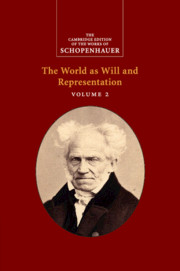Chapter 14 - On the Association of Ideas
Published online by Cambridge University Press: 30 June 2022
Summary
The presence of representations and ideas in our consciousness is as rigorously subject to the principle of sufficient reason in its different forms as the movement of bodies is to the laws of causality. It is as impossible for an idea to enter consciousness without an occasion as it is for a body to start moving without a cause. Now this occasion is either external, which is to say an impression on the senses; or internal, which is to say it is itself an idea that introduces another one by way of association. This in turn is either based on a relation of ground and consequent holding between them, or on similarity (even a mere analogy), or finally on their first being apprehended at the same time, which is in turn grounded in the spatial proximity of their objects. These last two cases are signified by the term‘à propos’. The intellectual worth of a mind is characterized by the predominance of one of these three linkages of association of ideas over the others: the first one mentioned will be dominant in thoughtful and thorough minds, the second in witty, spirited, poetic minds, and the third in feeble minds. No less characteristic is the facility with which one idea calls forth others that stand in some relation to it: this constitutes the quickness of the mind. But the impossibility of the appearance of an idea in the absence of its sufficient occasion, even with the strongest will that it be brought forward, is attested to by all those times when we try in vain to remember something, and search through the entire ware-house of our ideas to find some one of themthat is associated with what we are looking for: if we find the former, the latter is there as well. Somebody trying to dredge up a memory will always begin by looking for a thread on which it hangs by the association of ideas. This is the basis of mnemonics as well: it seeks to provide us with easily found occasions for all the concepts, ideas, or words that we want to keep in reserve.
- Type
- Chapter
- Information
- Schopenhauer: The World as Will and Representation , pp. 142 - 145Publisher: Cambridge University PressPrint publication year: 2018

